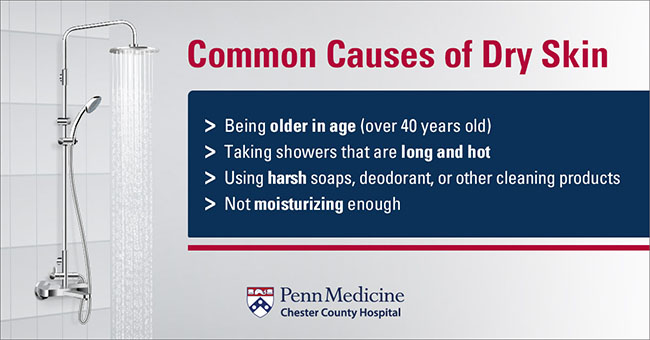
You get stuck in traffic. Someone's phone goes off in a movie theater. You don't remember why you walked into a room. Annoying experiences are just a part of life — and some are related to your body.
Dry skin is one of those common, yet frustrating, conditions that you have probably experienced at one time or another. It can affect people of all ages and skin types — and while you may be used to dealing with dry skin during the winter, it can pop up during any season.
Whether you get dry elbows every now and then or struggle with chronic dryness, knowing more about what is going on with the largest organ in your body (Hint: it’s your skin!) can help your skin stay healthy and hydrated.
Why Is My Skin Dry?
Sometimes it seems like dry skin comes out of nowhere and without warning. When your skin loses moisture too quickly, that's when you might notice it feels dry, tight, itchy, or even raw.

While dry skin can happen to anyone, some factors can mean you have a higher risk for developing dry skin. Some of these factors might be things you can control, and others are just a part of life.
Environmental Risk Factors for Dry Skin:
- Living somewhere where the weather is cold and dry
- Having a job where you use harsh chemicals, like a hairdresser or construction worker
- Having a job where your hands are often washed or in water, like a nurse of florist
Individual Risk Factors for Dry Skin:
- Having fair, black, or brown skin
- Taking certain medications, like diuretics or statins
- Having a skin condition, like atopic dermatitis (eczema) or psoriasis
- Receiving cancer treatments, like chemotherapy or radiation
- Smoking
How Can I Treat My Dry Skin?
When you notice patches of dry skin, it is important to remember that you have treatment options. Oftentimes, dry skin can be treated at home and with over-the-counter treatments.
"When your skin is dry, your best friend is going to be a moisturizer. You might think that moisturizing has to be a part of some 10-step skincare routine, but that's actually not the case," says Sarah Todd, MD, Dematologist with Chester County Hospital. "To help treat and prevent dry skin from occurring, moisturize a few times a day — especially after you take a bath or shower."
It is also important to take steps to avoid further irritating dry patches of skin, which you can do by wearing cotton, loose-fitting clothing and using gentle, fragrance-free soaps.
In addition to treating dry skin when you notice it, you can also take steps to prevent it from happening in the first place by:
- Staying hydrated. Drinking enough water can be helpful for your skin, but also for your overall health and wellness.
- Getting a humidifier and letting it run while you sleep. This can help put some moisture back into the air and into your skin.
- Not using tanning beds. The harsh UV rays can dry out and damage your skin.
When Should I See a Dermatologist?
During the winter months, it might be easy to guess that your dry skin is a result of the weather — especially if it is the only time of year your skin becomes dry. But if your skin is staying dry for longer periods of time or if it pops up randomly throughout the year, you may wonder what's going on.
It might be time to see a dermatologist if:
- You are experiencing lasting dryness that is not getting better with self-care measures
- Your patches of dry skin are also scaly or raised (this may be a sign of plaque psoriasis)
- Your dry skin also includes symptoms like itching, redness, or flaking
- Your symptoms are interfering with your daily activities or are keeping you from sleeping
"A dermatologist can assess your skin and determine what might be causing your symptoms. They may perform a skin biopsy or other tests to see if your dry skin is caused by something like eczema or psoriasis," says Dr. Todd.
Dermatologists can also create a treatment plan specific to your skin and symptoms. That may include prescription-strength moisturizers, topical steroids, or other medications to help relieve symptoms and improve the overall health of your skin. They can also help you find ways to protect your skin and prevent dryness from coming back.
If you have dry skin, you are not alone. Many people deal with this issue at some point in their lives, and it can be tricky to manage. Dry skin can leave you feeling uncomfortable, itchy, or even embarrassed — but the good news is that there are steps you can take to help restore your skin's natural moisture and achieve a smoother, healthier complexion.
Talk to a Chester County Hospital Dermatologist:
If you have dry skin that isn’t going away with self-care, it might be time to talk to a dermatologist. Find a dermatologist online, or call our Physician Referral Service at 800-789-PENN (7366).